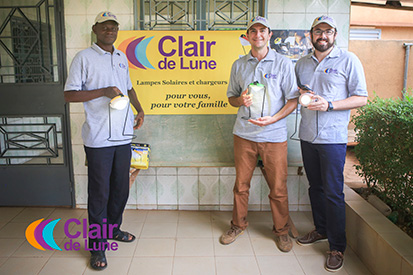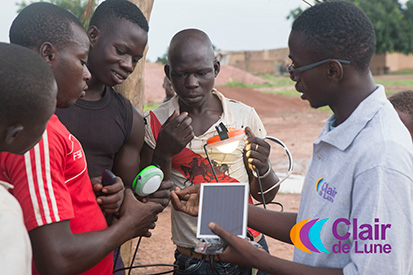Clair de Lune: 2014 Fletcher D-Prize Winners Develop Innovative Distribution Models to Help Light the Night in Rural African Villages
“Buses are the West African version of FedEx and Paypal mixed together.” Andrew Lala, Clair de Lune co-founder.
In remote regions of Sub-Saharan African, where local bus routes provide one of the few regular connections between businesses and families, two Fletcher graduates are finding a way to bring people light from a natural source: the bus driver.
Pioneered by Tommy Galloway (F14) and Andrew Lala (F14) and funded in part by $15,000 from The Fletcher D-Prize Poverty Solutions Venture Competition, Clair de Lune – French for “moonlight” – aims to bring solar lights to villages in Sub-Saharan Africa.
Many families – upwards of 600 million people throughout the region – rely on kerosene lanterns to light their homes. Yet, solar lanterns provide a cheaper, safer and cleaner alternative. Families that buy solar lamps save money on energy expenses and are more productive outside of daylight hours. Household incomes often increase 15-30 percent. Children study for an additional two hours a day.

The solar lighting solution existed, but without traditional delivery networks found in other parts of the world, Clair de Lune’s creators hoped to find a way to bring the lights to those who could benefit most from them. They drew inspiration from their prior experiences in the region – Andrew in Burkina Faso and Tommy in Myanmar – where they saw firsthand the powerful conduit buses serve as for transport of all kinds, from people to goods to information.
“I saw my Burkinabé counterparts frequently going to bus stations to send cash and goods that you couldn’t find in villages – such as flashlights and cell phones – to rural family members,” Andrew said. “Buses are the West African version of FedEx and Paypal mixed together.”
Based on this model, the Fletcher alumni duo implemented a distribution platform that leverages existing bus infrastructure and cultural remittance practices to bring solar lights to these hard to reach region. Starting in the summer of 2014 with 400 off-the-grid families in Burkina Faso, they aim to scale to 30,000 customers within two years.

Tommy and Andrew have faced some challenges, from lack of infrastructure to difficult trade policies, yet the pilot program continues onward with new opportunities as Clair de Lune looks for second round investment. What was once a simple business plan hatched on the seventh floor of the Cabot building at Fletcher has evolved into a tangible and promising network of clients and partners on a real path to helping fight poverty.
“Every day you can engage in creating something new that you fundamentally believe in,” Tommy said, “and that is affirmed with every step forward we make.”